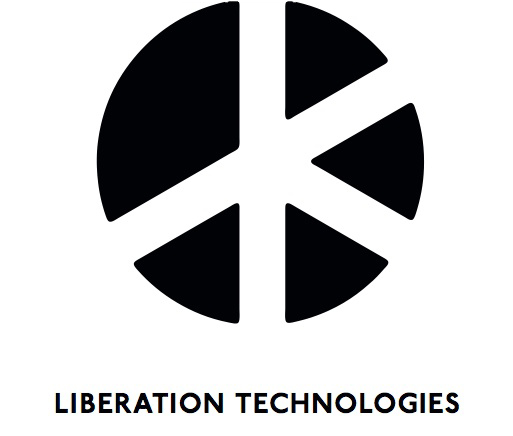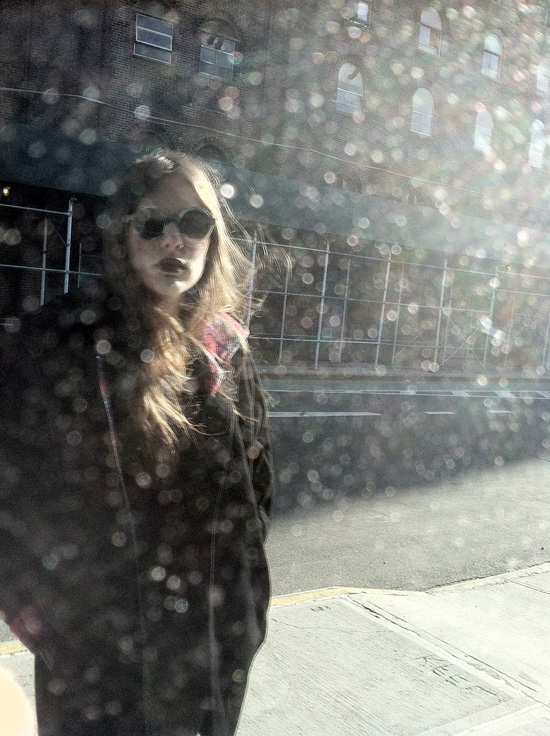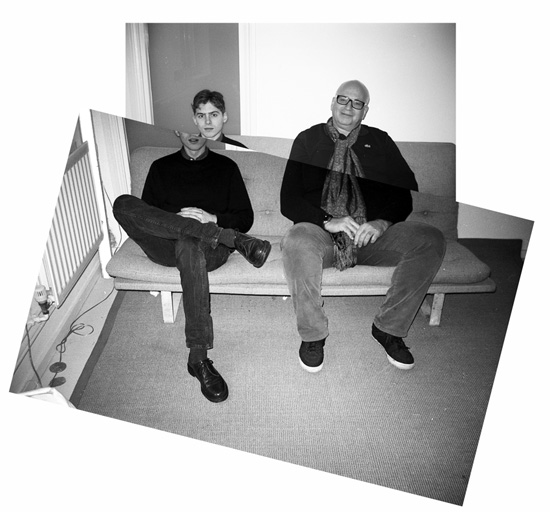Exciting news! Mute have announced the launch of a new label this spring, intended specifically as an output for boundary pushing electronic music. Entitled Liberation Technologies after the name of Mute’s early internet presence, it will be headed up by Patrick O’Neill, a former A&R for the likes of Domino and Honest Jons, and intends to work with both established and brand new artists.
The idea behind the label is to encourage both new artists and those who already have a few releases under their belt to push outward in new directions and challenge themselves – and in some cases the results will be released anonymously. It also intends to maintain a very strong visual aesthetic, working with designer/typographer/illustrator Ben Drury.
The label’s first release will come from King Felix, a producer based in New York. The Spring EP is a tremendous piece of work. Its woozy synthlines and shifting rhythms might well sound rather familiar to anyone who’s been keeping an ear on our favourite electronic music over the last year or so – it’s actually a pseudonym of the excellent Laurel Halo, whose Hour Logic EP landed high in our records of 2011 list. The title track’s been a highlight of her live sets for some time now, so it’s great to hear it in recorded form.
The four track EP’s hazy melodies and club-driven percussion are a little reminiscent of the saturated tones of classic Detroit techno and electro, and far more dancefloor driven than anything she’s done before. However, their very fluid approach to rhythm feels rather more modern, bringing to mind everything from the manic patter of Chicago footwork to the submerged disco of labels like Hippos In Tanks (who released Hour Logic) and Not Not Fun. The Spring EP will be released on 12" vinyl and digitally on 19th March.
Mute has a long history with electronic music, so in that light the founding of Liberation Technologies makes perfect sense. The label’s output during the eighties was instrumental in ushering electronic sounds into mainstream ears, via infiltrators like Yazoo and Depeche Mode, as well as through the more experimental likes of Cabaret Voltaire. And throughout the label’s running history, their work with associated labels (and Liberation Technologies predecessors) Rhythm King and Novamute directly connected them to the evolution of more underground club music, from the likes of Bomb The Bass to boundary-pushers like Richie Hawtin (aka Plastikman).

So at a time when an increasingly varied mass of music is being made by producers in the comfort of their own bedrooms, Mute’s re-entry into the fray with Liberation Technologies feels timely, and the label’s aim rather distinct to any of their closest current contemporaries. the Quietus travelled to the Mute offices to meet up with O’Neill and Mute label head Daniel Miller, to discuss their plans for the label and their feelings on the current state of electronic music.
So how did Mute Liberation Technologies begin – why did you decide to set up a new label?
Daniel Miller: We’ve had labels [in the past] for, in broad terms, electronic dance music – it’s something we’ve been involved with for many, many years. Firstly with Rhythm King in the mid-eighties – people like Bomb The Bass and S-Express – then when we stopped that we started Novamute, working with people like Richie Hawtin and Speedy J. Novamute was a really great label but for a number of reasons it wound down, partly because people working on it moved out to Berlin, but also because the system at EMI, when we were at EMI, made it very difficult to do that kind of thing. There weren’t really the outlets for it through [their] system, so we regrettably it wound down.
Then as soon as Mute left EMI, it was something I definitely wanted to start again: a label which could be experimental dance music, electronic music, for things that would be more like one-offs that could possibly develop into other things down the line. I’d met Paddy a couple of years ago and thought he’d be the right person to head it up.
So it’s just been a process of setting it up since the EMI thing came to a close?
DM: The usual sort of things. We wanted to go through different distribution than usual, finding the right artists, just the usual bits and pieces.
What’s your background, Paddy?
Patrick O’Neill: I’ve always worked within A&R. I’ve worked for Domino, previous to here I was at Columbia Sony. But I think my favorite time for signing acts for the music I really love was working at Honest Jons – while I was there I signed Actress for an album [Splazsh]. Honest Jons was the perfect time for me to work with really interesting, diverse acts. People like T++, and Actress, and Moritz Von Oswald.
[With Liberation Technologies], it’s about getting it right, from my perspective. I think Daniel had a clear vision of what he wanted it to be, and I have a definite vision of what I want the label to become, and it needs to start as it means to go on really. So we got Ben Drury to do the artwork. It was really important to get him on board – Ben, like Will Bankhead, is a very unique designer in that they both offer more than just a graphic designer, they offer another set of ears, they’re just a real great all round package. So for me, working with Ben was really important, getting the right distributor was very important. Then I thought it was really important that we had three releases lined up to begin with. That hasn’t really turned out to be the case, but I’ve settled on one really strong release to launch the label, and past that we’ve got a long list of people that are really interested in contributing, from established people to new artists. So I guess was just about taking the time to get it right.
DM: Also, there’s a lot of good labels out there, working in this general field. If we were going to do something, we wanted to make sure we did it in our way, that was very special to us. I’m not saying better or worse than anyone else, but that definitely stood out, in the way that we worked with the artists.
That’s what I’m interested in – how do you go about standing out? Electronic music’s in a good state at the moment.
DM: There’s a lot of it – which doesn’t actually mean it’s in a good state. But there’s a lot of good stuff, definitely. And it’s just about trying to find the right thing, and work with artists who we think represent what we want to do, and might possibly down the line become more long-term artists.
Did you have an idea of what kind of sound you were looking for?
PO’N: The Mute ethos is to work with progressive acts, people who’ve got one eye on what happens next. With the label, it was just really furthering that. The one thing I’m really conscious of is that we’re not an artist label. There are all these great labels coming out now – Numbers, Hessle, Swamp, and all the Berlin labels like Ostgut Ton – [but unlike them] we haven’t got a foundation of artists working with us. The sound is intentionally not specific.
DM: We haven’t gone for a particular genre. It’s more like progressive, in the broader sense of the word, electronic music.
Which I suppose works with the history of Mute too.
DM: Novamute was the same. It was always an extension of Mute and what our history was about. It was focusing on an area I’ve always been very interested in and people here are interested in, but you have to do it in a very focused way. As Paddy said, it’s not really about a sound, it’s more about a sense of quality.
Did you specifically want there to be a ‘dance’ element to the label?
PO’N: Not specifically dance or non dance. There’s so much brilliant and progressive music that’s come from the dancefloor that is as standalone brilliant away from that environment. Like LFO, or Richie Hawtin’s ‘Spastik’, all these great artists that have gone on to be very progressive album artists in their own right. So it can come from that, or it can be something that’s really non dancefloor.
DM: And when ‘Spastik’ came out a lot of people questioned whether it was for the dancefloor.
And years down the line that fact’s been borne out in the fact that you still hear it played on peaktime dancefloors.
DM: It definitely mystified a lot of people when it came out. And there’s no harm in mystifying people, if it’s good quality.
It seems there is a lot of electronic music at the moment that’s doing a very good job of hanging between those borders of dance and non dance at the moment. The King Felix record is a really great example of that. I imagine that aspect is inevitably going to factor in.
PO’N: Absolutely. That King Felix record is a really good example. It’s not bpm specific, it’s just a really good standalone piece of electronic music that has identity and character and is unique to that artist. And I think all the artists that we’d like to work with have that quality about them. You talk about people like Actress, Basic Channel, Richie Hawtin, you can identify those tracks immediately when you hear them as specific to that artist, but they don’t fall within any…
There’s a certain idiosyncratic quality to them. They don’t really sound like anyone else.
DM: That’s the thing. It’s pretty easy to make quite good electronic music now. Because the tools are available and it’s not that difficult to do it. But to to do something that’s original, that really stands out, is still as difficult as it always was. And I suppose that’s what we’re looking for.
PO’N: It’s what you said – there’s such a lot of good electronic music out there, but there’s not… When we were starting this label, I really had to rack my brains and think: who is really making concerted efforts to do something a bit different? And who has a bit of a different approach to making music? Like Daniel said, there’s an infinite amount of programmes and synths, you can make great sounding records but you can’t necessarily make records with character. There’s only a handful of artists that can do that.

King Felix/Laurel Halo
So can you say much about the artists you are planning to work with? I gather quite a lot of them are going to be anonymous.
DM: They’re not necessarily anonymous, they could be people who are brand new. It’s a platform for people who might have done a few records before to do stuff under a different name, but it’s also for new artists as well.
Are you at liberty to divulge anything at the moment?
DM: I’m not! But he might.
PO’N: I can tell you the sort of acts I’m really into, that I really love at the moment. People like Regis – I think is doing something very specifically brilliant. I really love the Young Echo stuff coming out of Bristol – Vessel and those guys. Actress is a huge inspiration to me, I think everything he does is fantastic. There’s a load of brilliant smaller German labels I really like, like Do Not Resist The Beat, and there’s. Roman Flügel is really great, he’s always made a concerted effort to make every record very different from the last. Those are the sort of people that are going to inspire what goes onto the label.
Quite a variety of sounds.
PO’N: What I really like is that we can bring a new context to certain artists by putting, say, a King Felix record next to a Berlin record, next to a London record. I think that’s what we can offer that’s maybe different from a lot of other labels. Putting established acts next to new acts can bring kudos to that new act, but it can also benefit more established artists as well. Regis has always been so specific in what he does, and I like the idea of maybe playing around with him next to a completely new and unknown artist.
[To Daniel] I’m quite interested in your feelings on electronic music now with reference to Mute. Can you hear Mute’s history in current electronic music?
DM: Some of it, yeah. I hear it more from the people who make it than in the sort of music they make. Which is probably good, because I’d rather they were inspired or influenced in some way that made them do something totally original. It’s nice to hear from electronic musicians that they were inspired by what we did over the years, so that’s great. It doesn’t mean I hear it in what they do – but that doesn’t matter, it’s more the purpose of what they’re doing.
Things that do sound like records that were on Mute interest me less than ones that sound totally original. When people say ‘Oh, this artist sounds like whatever artist on Mute’, it immediately turns me off. I’d rather people say ‘Oh, that’s weird, I’d never have thought Mute would have signed so and so’. Not because we’d do something just for the sake of [getting people to think that], but because we don’t think too much about the context – just the artist. It’s purely about the artist, really, it could be anything.
I’m interested in the use of Liberation Technologies as a title – that was your early web presence, right?
DM: Back in the day, even before DVDs – I think they were called CDVs then – we had this idea for about 5 minutes to have this digital umbrella thing called Mute Liberation Technologies, which covered the website, which covered the DVDs. Obviously as things progressed it didn’t make that much sense, but we hung onto the name because we just thought it was a good name.
It seems weirdly appropriate. Thinking about it in terms of ‘Liberation Technologies’ as a reference to the internet, what it is, and what it does – so many newer musicians have been given this artistic freedom, because the internet’s opened up easy channels for production software and music distribution.
DM: It comes from ‘Liberation Theology’. The Latin American revolutionaries were mostly run by Catholics – Catholic priests were very involved in it – and it was called Liberation Theology. It’s not that we’re in any way religiously aligned with them. But I thought it was a good name. [laughs] So I nicked that.
PO’N: We were bandying around new names for quite a long time. I was speaking to an old Mute head and it came up, and he said, ‘What about Mute Liberation Technologies?’ And instantly it just made sense. I’d never heard anything about its history or whatever, but I think it’s really quite funny in a way. It’s quite tongue in cheek, because if you see it written down you can take what you want. [It’s] to not just be that po-faced electronic music label. Everyone I’ve spoken to about the name has immediately reacted to it, and I think people can interpret it the way they want.



